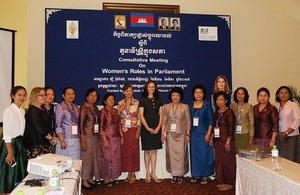After Consultative Meeting, UK-Cambodia seek future cooperation
Consultative Meeting between Cambodian Parliamentary Members and a senior Clerk from the UK House of Parliament was held on 30-31 March 2015

Consultative meeting between Cambodia and UK Parliament
Two days of consultative meetings on 30-31 March between a senior clerk from the UK Houses of Parliament and Cambodian parliamentary members from the ruling CPP and opposition CNRP end with fruitful outcomes. Participants expressed their satisfaction and vowed to tighten future cooperation.
The first day’s session covered political party structures, the role of the opposition, financing of political parties, parliamentary oversight, and the legislative process. Discussions went into details including the roles of political party groups, the roles of the ruling party and opposition in the legislative process, and the funding system for political party groups in the UK.
13 Cambodian MPs attended, five from the CPP and eight from the CNRP.
The second day saw ten female MPs (out of a total of 25) as well as female members of parliamentary and senate staff come together to discuss ways to increase the participation of women in parliament. They started the session with group discussions about strengths, weaknesses, opportunities and challenges for women in senior leadership roles.
There was much common ground with the UK. Female representation in both Cambodia and the UK (House of Commons) is almost identical, at just over 20%. Challenges identified included matriarchal traditions where women are expected to be the principal caregiver in families, lower education of girls, economic and financial barriers, low confidence levels, and media discrimination against women.
Excellency Khuon Sudary, chairperson of the newly formed Women’s Caucus of the National Assembly said during her opening remarks that women’s affairs in Cambodia are multispectral issues which demand participants from all parties in society.
During discussions, she said:
Due to civil wars, Cambodian women have been very vulnerable and I encourage all party leaders to think of increasing women’s participation in the process of making laws and making decisions.
Mu Sochua, vice president of the Women Caucus, said:
Cambodian women should go out and be ready to get exposed more to the public. They should be brave and talk to media to inspire young Cambodian women. Doing so will help reduce women’s fears, especially in the world of politics.
Dr Bryony Mathew, Deputy Head of Mission at the British Embassy said:
I have been impressed by the open, honest discussions that have taken place this morning. Participants have spoken of the need to change the status of women in Cambodia. That women need equal rights to men.
They need to have the same opportunity to contribute to the development of their country. And education is key. A good education will give girls the skills, knowledge and self-confidence they need to become future leaders.
The consultative meetings were funded by the British Embassy, and set up in order to share UK experience, to bring new ideas of elements of the UK system which may be applicable for Cambodia, and also to look at where the UK can learn from the Cambodian side.
The UK clerk, Ms Gosia McBride, arrived in Phnom Penh on 25 March and spent three days meeting with senior Cambodian parliamentary members as well as organisations that work closely with the Cambodian National Assembly, before the consultative meetings took place the following week.
They discussed working procedures in the UK parliaments and looked at how Cambodian parliamentary members can ensure that the National Assembly runs as effectively as possible.
Follow us on Facebook: UK in Cambodia and Twitter @ukincambodia